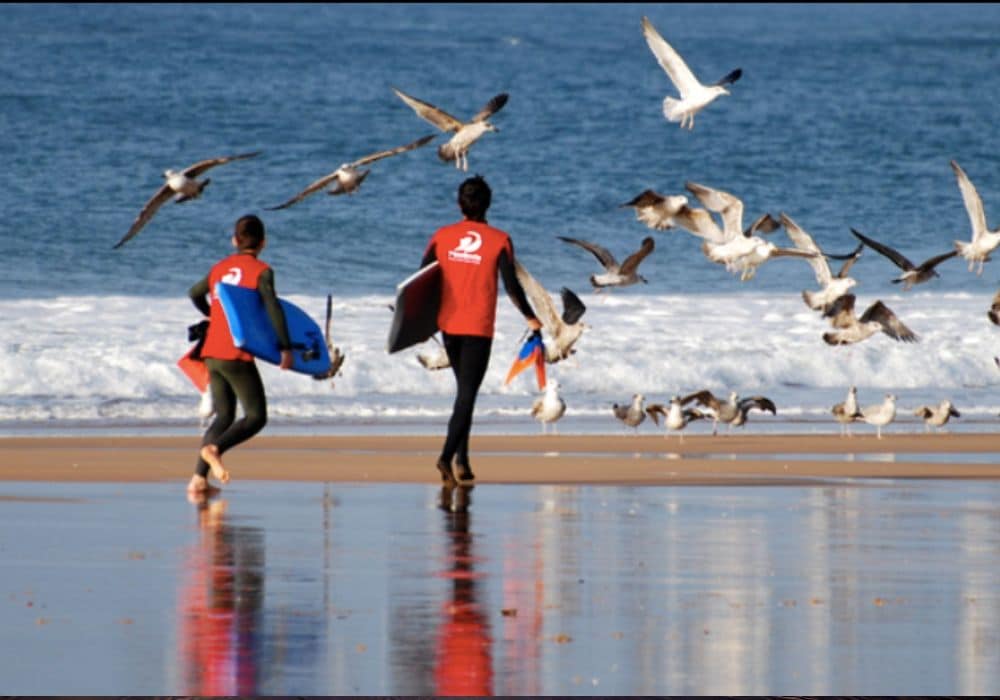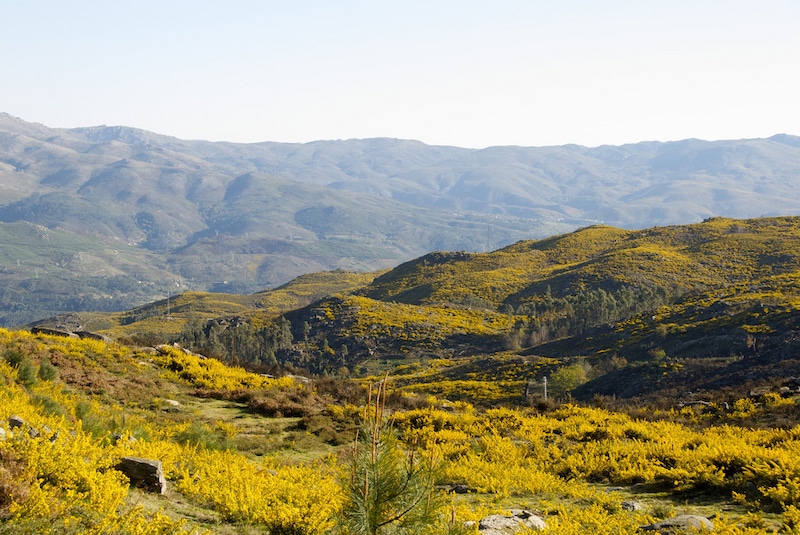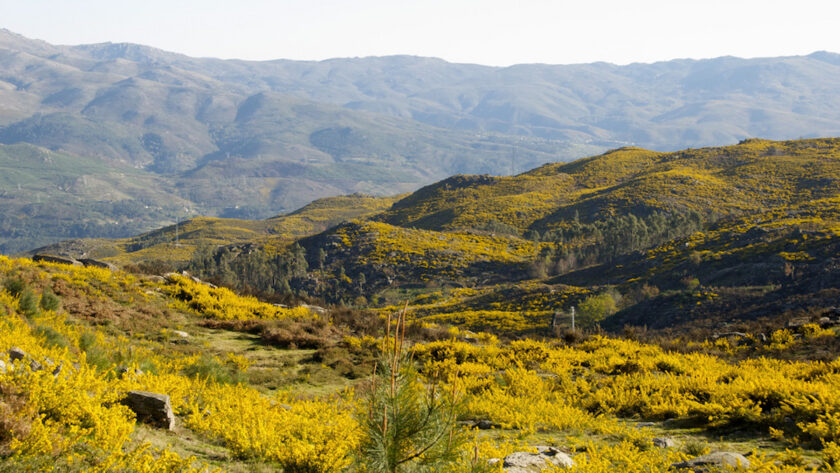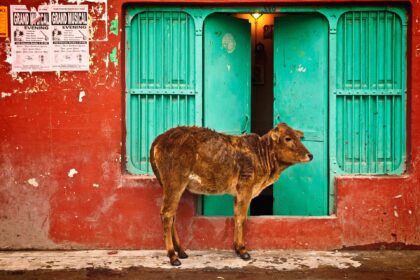By Nancy Michelle Cote. This guide to eco-friendly Portugal contains affiliate links to trusted partners!
Looking to explore eco-tourism in Portugal?
Then you’re in the right place!
Portugal is a beautiful country full of stunning landscapes, vibrant cities, and friendly people.
It’s also becoming increasingly known for its commitment to eco-tourism, with a wide range of sustainable experiences available for tourists looking to explore the natural beauty of this amazing nation.
From kayaking through remote mountain valleys and exploring ancient forests to camping in secluded spots away from the hustle and bustle of daily life, Portugal has something for everyone who wants to enjoy nature without damaging it.
Here is a comprehensive Portugal tourism guide sharing some of the most incredible sustainable experiences you can have while visiting!
What Is Ecotourism?
According to UNWTO, ecotourism is an “all nature-based form of tourism in which the main motivation of the tourists is the observation and appreciation of nature as well as the traditional cultures prevailing in natural areas.”
In theory, ecotours are intended to be educational while being fun, encouraging people to learn more about nature and conservation through firsthand experiences.
It is a way for travelers to have an immersive experience in nature without negatively affecting the environment.
Examples of ecotourism, when done properly, may include bird-watching tours, visits to national parks and reserves, cultural trips focused on Indigenous customs of native peoples, and volunteering holidays such as planting trees or building trails.
The goal of eco-tourism is to minimize negative impacts on both the environment as well as local cultures and economies by promoting socially responsible behavior among tourists during their visit.
How Eco-Friendly Is Portugal?
Portugal is an increasingly eco-friendly country, with numerous sustainable initiatives and programs in place. It has adopted the European Union’s circular economy strategy and its Green Deal initiative, which is focused on zero carbon emissions by 2030.
The Portuguese Government has also invested in renewable energy sources like wind and solar power. As a result of these efforts, Portugal was recently named one of the world’s top 50 greenest countries by Yale University’s Environmental Performance Index (EPI).
Additionally, Portugal is committed to protecting its environments through various nature conservation initiatives such as the Natura 2000 network. This network provides legal protection to important habitats including coastal wetlands, lagoons, and dunes.
All of these initiatives help to make Portugal an excellent destination for visitors looking to experience sustainable travel.
Best Ways To Explore Eco-Tourism In Portugal

1. Explore the Tapada de Mafra Nature Reserve near Mafra
Tapada de Mafra is a stunning nature reserve located just a few minutes away from the town of Mafra on the west coast of Portugal.
It has recently been declared a UNESCO World Heritage site and is home to valuable biodiversity.
The reserve subsidizes research and preservation of the indigenous fauna and flora in the reserve and promotes environmental education in several private and public initiatives.
This ecological haven is perfect for those interested in eco-tourism in Portugal, offering a variety of experiences between the lush green trails and local wildlife.
Opt for an easy or moderate hike along the winding trails and try to spot deer, wild boar, foxes, and various birds living in their natural habitat.
There are also options for mountain biking, forest running, and even doing a canopy tour to see the reserve from above!
Since educating the population is one of the principal objectives of this project, various presentations on the forest, birds, and bees are also all part of the experience.

2. Visit the Iberian Wolf Recovery Center near Mafra
The Iberian Wolf Recovery Center, also located near Mafra, is an important stop on any eco-tour of Portugal.
Open to the public, visitors can learn about the conservation work being done to protect this endangered species and the vital role these wolves play in the ecosystem.
The 18 acres are a sanctuary for wolves that cannot live in the wild due to being victims of traps or illegal captivity, or coming from parks and zoos.
The main purpose of the center is to educate the population and aid in research initiatives. Guided tours of the grounds are offered where visitors can observe the wolves from afar — which is an important aspect of ethical wildlife tourism.
Additionally, the center offers wolves that have been orphaned or injured a safe environment to aid in their recovery and hopefully reintegrate them into the wild.
The center’s educational program is a great way to inform visitors about the importance of nature conservation and species preservation.
With interactive exhibits and educational presentations, visitors can gain an appreciation for the Iberian Wolf’s unique place in Portugal’s environment.

3. Join a yoga surf retreat in Ericeira
Ericeira is the first and only World Surf Reserve in Europe, recognized by the Save the Waves Coalition program that dedicates itself to preserving outstanding surf spots around the world.
It has also recently been certified as a Biosphere Destination that works to guarantee a balanced relationship between human activity, environmental protection, and preservation of historical and cultural heritage.
Ericeira’s 4-kilometer (2.5-mile) surf zone is home to seven world-class waves. The reserve strives to protect the micro-ecosystems of each surf spot since each has its own landscape and unique characteristics caused by the alterations in the sea floor and human activity.
Possibly the best way to enjoy the relaxed local surf culture is by partaking in a retreat with Surf Yoga Portugal, which hosts some of the best surf and yoga retreats in Portugal.
Through their program, you can expect macrobiotic food, surf lessons, and yoga classes — as well as soothing therapies like reiki and massage.
Don’t miss Ericeira if you want to experience the beauty of a World Surf Reserve while learning some new skills.
You can also check out some other top yoga and surf retreats in Ericeira here.

4. Hike the Caminho Português da Costa from Lisbon or Porto
Part of the network of Camino de Santiago routes, the epic Caminho Português da Costa is a must.
This 600-kilometer (373-mile) trek takes you from Lisbon’s center along the coastline to Porto and then Santiago de Compostela in Spain in 25 days. It’s a popular experience for solo travelers to Lisbon who want a solitary experience with nature as well as couples and groups.
You’ll pass by several protected areas — such as the Natural Park of the North Coast in Esposende and the Douro Estuary Natural Reserve — along with some of Portugal’s most stunning coastline.
You’ll also get the chance to see some incredible beaches and local wildlife along your journey. The highlight for many is the Mindelo Ornithological Reserve, which harbors 145 species of birds. It is part of the National Network of Protected Areas and boasts very rich biodiversity.
Those wanting a shorter experience can start in Porto and arrive in Santiago de Compostela after about 12 days of walking.
Although not for all, this type of trip is an incredible opportunity for people looking to experience eco-tourism in Portugal. Just make sure to practice Leave No Trace principles along the way!
Click here for details on how to hike the trail from Lisbon.
Click here for details on how to hike the trail from Porto.
Only have room for a 3-day Porto itinerary? Here are some other fun local things to do in the city.

5. Hike the stunning Penada-Geres National Park
Penada-Geres National Park is one of the most beautiful and unique natural areas in Europe.
Visitors looking for eco-tourism experiences in Portugal can explore a variety of outdoor activities, immerse themselves in local culture, and learn about the rich history of the region.
Make sure to visit some of the traditional villages in the national park, such as Castro Laboreiro and Lindoso, with their castle ruins and time-honored events.
Also don’t miss the Peneda Gerês Sanctuary, an impressive 18th-century monument with 20 chapels built into the surrounding craggy cliffs.
The natural park aims to protect the flora and fauna of the region as well as the landscape and natural resources in the area.
In terms of hiking, the park has trails suited for hikers of all abilities, from easy loop trails to more challenging multi-day expeditions.
Along the way, you can discover stunning waterfalls and wildlife, observe mountains and forests up close, and even have active adventures like mountain biking or climbing.
You view some of the best trails in Peneda-Geres National Park here.
If a relaxing escape is more your style, consider taking a dip in the natural thermal spas or simply spending time by one of the many lakes with a great book.
Camp grounds can be found around the park and visitors can enjoy some of the best camping in Portugal.
Whether you’re looking for an adventure-filled day or simply want to escape into nature and enjoy scenic views, Penada-Geres National Park has it all!

6. Dive in Madeira at the Garajau Nature Reserve
Garajau Nature Reserve on the island of Madeira is a paradise for eco-tourists in Portugal.
Established in 1986 to protect the seabed from desertification, this area is now home to some of the most diverse wildlife in the archipelago.
Whether you’re an experienced diver or just starting out, diving in Garajau is a treat.
The Garajau Nature Reserve is teeming with aquatic life, from colorful coral reefs to curious fish and even some larger marine animals like the giant manta ray and the giant devil ray.
When planning your trip, just make sure to choose a PADI dive center like Azul Diving Center Madeira to ensure they follow sustainable practices.
Not into diving? Kayaking and snorkeling are also great ways to explore the reserve without going too deep into the ocean’s depths.
Along the shoreline, there are plenty of sea caves and rock formations to explore, and you might even spot some dolphins or turtles along the way.
No matter how you choose to explore Garajau Nature Reserve, it’s sure to be an unforgettable experience.

7. Explore the Laurisilva on Madeira Island
The Laurisilva (Laurel Forest) of Madeira is a UNESCO World Heritage site and a remarkable ecological wonder, located within the Parque Natural da Madeira (Madeira Natural Park).
This lush and ancient forest, estimated to be around 20 million years old, contains an unparalleled wealth of biodiversity and plays a critical role in maintaining the hydrological balance on Madeira Island.
This means the forest is an important source of drinking water on the island which has historically been channeled to human settlements.
Research done here sheds light on the evolution and adaptation of fauna and flora based on environmental conditions, which change over time.
Featuring a unique network of rivers, streams, and waterfalls, this pristine environment is home to a variety of endemic species — like the Madeiran long-toed pigeon — and offers some unique experiences, including the opportunity to observe wild green macaws.
This captivating landscape also provides the perfect backdrop for numerous outdoor activities such as hiking, biking, trail running, canyoning, coasteering, and climbing.
No matter the activity, visitors are sure to experience a truly unforgettable eco-friendly adventure.

8. Hike at the eco-friendly Sete Cidades in the Azores
Sete Cidades, located on the Azores archipelago in Portugal, is a stunning natural wonder and one of the best destinations for ecotourism off the coast of Portugal.
It is the world’s first archipelago certified as a Sustainable Tourism Destination, under the EarthCheck Sustainable Destination program. The government is committed to promoting sustainable development on all the islands which will result in truly sustainable tourism by 2030.
Home to a variety of lagoons, craters, and a dormant volcano, this area is a protected landscape and is a Rede Natura 2000 Protected Vista.
Some of the most popular activities in this area include bird watching, hiking, and mountain biking.
For those who want to explore deeper into the nature reserve, there are plenty of trails ranging from 2 to 4 hours in length that offer breathtaking views of the blue and green lagoons and an opportunity to experience a unique and magical landscape.
Learn about some of the best trails in Sete Cidades here.
With its commitment to preserving its natural environment, Sete Cidades serves as an excellent destination for eco-tourism and sustainable tourism in Portugal.

9. Enjoy a Portugal farm experience at the Douro International Natural Park
Near the inland city of Castelo Branco, you can visit the Douro International Natural Park and its namesake river to explore Portugal’s natural wonders and have a glass (or four) of wine!
Whether it’s from the land or from a boat, travelers can get an up-close look at this picturesque landscape with its combination of forest, vineyards, olive trees, and almond trees.
Opt for an Arribes del Douro Cruise and enjoy an environmental-focused cruise down the Douro River while taking in stunning views of terraced vineyards, lush forests, and dramatic cliffs.
The landscape has been protected to preserve the natural habitat of indigenous plants and wildlife. It also harbors protected eagles and vultures, which you are almost sure to see while exploring the trails.
For an even more immersive experience, visitors can gain first-hand insight into Portuguese culture by participating in a Portugal farm experience in the area, like this one.
Many offer tours of the local vineyards and wineries, not to mention farm stays are a wonderful way to see the countryside.

10. Go kayaking or diving at Berlengas Natural Reserve near Peniche
Berlengas Natural Reserve is a one-of-a-kind destination for Portugal ecotourism enthusiasts.
The reserve aims to conserve the habitat of marine life, seabird populations, and endemic plants in the area by developing damage control strategies to reduce the impact of human activity.
Residing off the coast of Peniche, this enchanting area boasts a stunning variety of fauna and flora, with its unique location giving visitors an unforgettable experience. If you’re lucky, you might even see a puffin!
Between May and October, visitors can take advantage of daily access to the island by boat.
With a maximum of 350 visitors allowed at any one time, Berlenga is the perfect place for those looking for a tranquil and secluded getaway from their everyday lives.
Whether you take walks on the island’s trails to visit its grottos and the Fort of the Berlengas, or simply enjoy its stunning scenery, there are plenty of opportunities to explore.
For the more daring, kayaking and diving are available as well, with a wealth of amazing biodiversity beneath the surface.
If you want to stay longer than an afternoon, you can even camp overnight or enjoy lunch at one of the island’s restaurants.
A visit to the Berlengas Natural Reserve is sure to leave you with unforgettable memories.

11. Go birdwatching at the Lagoas de Santo André and Sancha Natural Reserve in Alentejo
The Lagoas de Santo André and Sancha Natural Reserve is a stunningly beautiful destination for eco-tours in the Alentejo region of Portugal.
Occupying a 15-kilometer (9-mile) stretch of coast, this officially protected area contains two wetlands that are home to a wide variety of birds.
The region enjoys abundant natural resources, making it a popular destination for birdwatching as well as other activities such as hiking, canoeing, and windsurfing.
The long sandy beaches of Costa de Santo André and Fonte do Cortiço provide the perfect opportunity for relaxation or a leisurely stroll.
Whether you’re looking for a chance to observe nature in the wild, or just a peaceful place to spend the day, the Lagoas de Santo André and Sancha Natural Reserve has something for everyone.

12. See the Iberian lynx at Serra da Malcata Natural Reserve in Central Portugal
Serra da Malcata Natural Reserve in the Central Region of Portugal is a paradise for nature lovers and eco-tourists alike.
It was created in 1981 to protect the near-extinct Iberian lynx, with only an estimated 100 of them remaining in the wild.
In addition to saving this magnificent creature from extinction, the reserve also provides a safe habitat for other animals and preserves the Mediterranean flora found in this area.
Visitors to the nature reserve will have the opportunity to explore virtually untouched forest. There’s an interpretative trail that teaches visitors about the importance of environmental preservation, as well as hiking trails and organized mountain bike tours to some of the most interesting spots.
Don’t miss out on the unique opportunity to observe the Iberian lynx, one of Portugal’s rarest species. It’s definitely an experience to remember!

13. Go dolphin watching in the Arrábida Natural Reserve in Setúbal
The Arrábida Natural Reserve is a stunning biogenetic reserve located in the district of Setúbal, Portugal. A biogenetic reserve is an area designated by the Council of Europe which protects a rare habitat or ecosystem and permits biological and genetic research.
It offers many unique experiences for those looking to explore its diverse marine flora and fauna.
Visitors can take a boat trip through the estuary of the Sado River to observe the three dozen Sado and Bottlenose Dolphins that live at the mouth of the river. It is one of the only three colonies in rivers on the European continent.
The distinctively calm waters in Arrábida also make it perfect for kayaking and diving.
The area is home to a high diversity of marine flora and fauna, making it an excellent spot for visitors looking to explore the wonders of nature.
Check out this incredible reserve on your next eco-tourism trip to Portugal!
Final Thoughts On Eco-Tourism In Portugal
With numerous examples of slow tourism in Portugal as well as initiatives and programs in place, travelers can explore this beautiful country with peace of mind knowing that their actions are helping preserve its natural beauty while benefiting local communities.
Whether you’re kayaking remote beaches on the Atlantic coast or hiking up Penada-Geres, there is something new and exciting around every corner when it comes to eco-tourism in Portugal!
What are your favorite ways to explore eco-tourism in Portugal?
About The Author

A beachcomber, an avid bookworm, and a teacher. Michelle is a Canadian travel blogger who writes about Portugal.
She fell in love with the charming Portuguese village of Ericeira when she was enticed to move there by her Portuguese husband and never looked back.
She now lives between Mallorca and Ericeira, with her family and Fluffy the hamster.
Follow her adventures on Ericeirafamilyadventures.com.
Nancy Michelle Cote
Latest posts by Nancy Michelle Cote (see all)
- Eco-Tourism In Portugal: 13 Amazing Sustainable Experiences - Mar 25, 2023






stunning biogenetic reserve , all the love
Great list. We are moving to Portugal in June and hope to explore the area like a tourist as well as a local. We have to be intentional about not falling into a routine when we move some place and go explore outside of our neighborhood.
You actually can’t see any iberian lynx at Malcata. Even though it is the face of the park, the populations have disapeared from it decades ago. There are many successful reintroduction efforts further south in the country, but not in Malcata. It’s a beautiful area, but the info you share shows that your knowledge on the place is close to zero 🙁